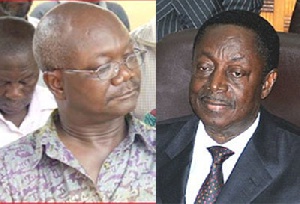Issues have started popping up about the absence of two former Ministers of Finance and Economic Planning under the National Democratic Congress (NDC) administration, Kwame Peprah and Dr Kwabena Duffuor, from the just-ended National Economic Forum.
The forum ended yesterday with 22-point communiqué, among which is the review of budget targets to reflect reality – a call that has been consistently made by Dr Anthony Akoto Osei, Minority Spokesman on Finance, since the beginning of the year. It took the three-day meeting for the managers of the economy to realize that they were operating on a wrong footing.
While government was complaining about the decision of the opposition New Patriotic Party (NPP) to boycott the meeting, the two prominent finance ministers who were among others, pencilled down to make their contributions at the Forum, failed to show up at the event which was held at the plush Senchi Royal Resort near Atimpoku in the Eastern Region.
Dr. Duffuor and his successor, Seth Terkper – who was the former’s deputy at the Finance Ministry, DAILY GUIDE learnt, are not on good terms and were not likely to share the same platform.
Though government claimed the event was important, checks indicated that Dr Duffuor, who maintained inflation at a single digit for over a year, was said to have travelled out of the country before its commencement.
Mr. Kwame Peprah was the SSNIT board chairman championing the sale of Merchant Bank to the South African Rand Bank before he was removed by Mahama, abrogating the deal.
Surprise Package
Interestingly, one figure who was seen actively participating in the Forum was Madam Akua Donkor, the founder and leader of the Ghana Freedom Party (GFP) – the party which could not meet basic requirements of the Electoral Commission (EC) to contest the 2012 general elections. Her invitation to the programme provoked a heated debate among Ghanaians, with some questioning the rationale behind her inclusion on the list of participants for such a serious national event. Late Wednesday, pictures of Akua Donkor ran on the various social media networks. She was captured sitting in one of the sessions at the Forum which was being chaired by Ghana’s longest serving Finance Minister, Dr. Kwesi Botchway. Akua Donkor, former Governor of the Bank of Ghana (BoG), Dr. Paul Acquah; IMANI-Ghana’s Franklin Cudjoe and the man who did an overview of the 2014 budget for the NDC and prides himself as an ‘economic policy analyst’, Peter Boamah Otokunor, were among those who met to decide the fate of the country. The Forum, which was supposed to be a four-day event, was cut short yesterday because of a supposed engagement of the Vice President. In all, 140 Ghanaians were said to have been drawn from various fields of human endeavour to the Forum.
The Senchi Consensus
The 22-point communiqué released yesterday evening dubbed, ‘The Senchi Consensus’ in which participants were said to have, among other things, agreed that “the Directive Principles of State Policy (Chapter 6 of the 1992 Constitution) must continue to guide the national development effort, anchored in a long term national development framework with a compelling vision.”
The Ministry of Finance has equally been charged to “as a matter of urgency, review the targets set in the 2014 budget” with the review expected to identify likely deviations and make proposals for plugging the resultant financing gap while the Bank of Ghana traces the implications of the revisions for monetary policy.
It also proposes the establishment of a mechanism to realign the budget whenever the economy is affected by unanticipated shocks.
The meeting also agreed that “further steps must be taken to support Small-Medium Enterprises (SME) in order to protect jobs,” while further efforts must be made to improve the efficiency of tax collection as well as broaden the tax base and reduce recourse to the introduction of new taxes with the incidence of discretionary tax exemptions to be reviewed and reduced.
Recommendations
They also stressed the need for government to take steps to revamp the manufacturing and agriculture sectors to encourage domestic production of some agricultural products as well as import substitutable manufactured goods.
Participants were also said to have made recommendations for the National Economic Forum to be institutionalized and that a committee be established to explore various options and models for undertaking this process of institutionalization.
“Government must take steps to galvanize consensus around other issues of national importance, especially with respect to political governance nation-building matters, and should initiate a process of involving citizens whose experience, insight and expertise will enhance economic policy management and national governance,” the document noted among others.
IMF Bailout
However, Head of Political Science Department at the Kwame Nkrumah University of Science and Technology (KNUST), Professor Richard Amoako Baah, says government has no other option than to go for a financial bailout from the International Monetary Fund (IMF).
According to him, “The longer we wait, the worse Ghana’s economic crisis gets” because it is obvious “government has run out of options.”
Dr. Amoako Baah made the comment on Asempa FM’s Ekosii Sen programme yesterday, while discussing the relevance of the ongoing National Economic Forum in Akosombo.
Dr. Amoako Baah maintained that the panacea to Ghana’s economic woes is not organizing forums.
He could not fathom why the Mahama-led administration could waste the scarce resources on about 400 people when the same activity could have been done by 20 economic experts and achieve the same results.
The Political Science lecturer intimated that the Mahama-led administration knows the solution to the challenges facing the economy but “lacks the political will to implement it.”
“I wish President Mahama well but I’m still holding my breath because we will definitely go to the IMF,” he added.
General News of Friday, 16 May 2014
Source: Daily Guide

















